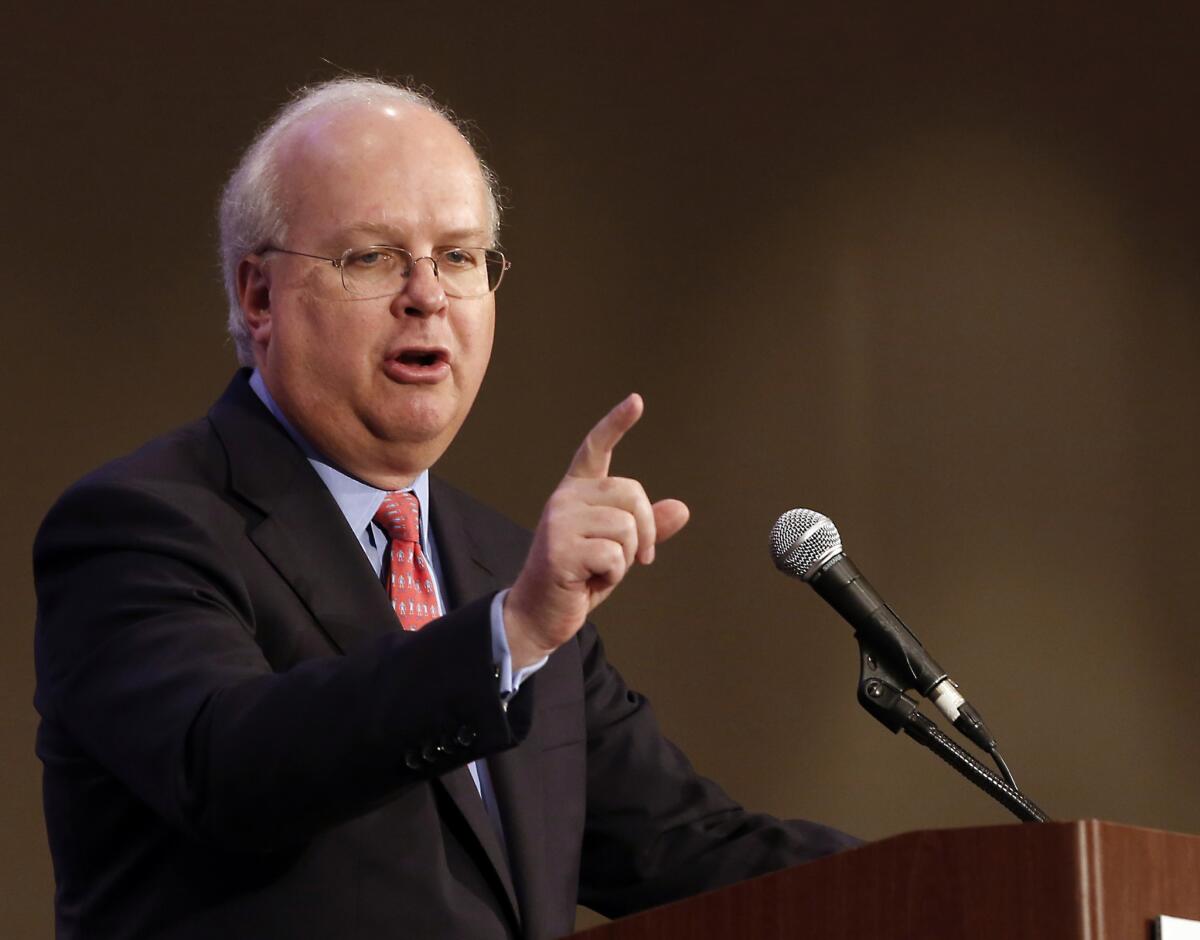Op-Ed: Karl Roveâs Crossroads GPS manages to make it even harder to find the dark money in U.S. politics

Republican strategist and fundraiser Karl Rove speaking in Sacramento, Calif. in March of 2013.
If you know nothing else about a candidate except that he or she is backed by the Koch brothers or George Soros, itâs often enough to help you make an informed decision about how you want to vote. Unfortunately, this week it became clear that finding out which plutocrats, corporations and interest groups are bankrolling American elections is only going to get harder.
The blog at the indispensable website OpenSecrets.org, of the Center for Responsive Politics, reported Tuesday that the IRS had quietly granted 501(c)(4) nonprofit status to Karl Roveâs political group Crossroads GPS. That implicitly gives a green light to âsocial welfare groupsâ to spend enormous sums on political ads, all without disclosing where these groups get their money.
Itâs a decision that will hurt our democracy. And it might never have happened if the IRS hadnât hamhandedly singled out tea party groups for investigation a few years earlier.
The IRS decision is likely to open the door to more shadow super PACs set up as non-disclosing social welfare groups.
Hereâs how we got to this place. In 2010, the Supreme Court decided Citizens United vs. FEC, allowing corporations and other entities to spend money to influence American elections as long as it was done independently of candidates and their organizations. Follow-up court cases and rulings of the Federal Election Commission led to super PACs â groups that can take unlimited contributions from individuals, corporations and others to fund election-related activities, such as ad campaigns.
For anyone worried about the effect of money on American politics, super PACs are a pernicious development. But at least contributions to super PACs have to be disclosed. Crossroads GPS found a way around that requirement.
Shortly after the Citizens United decision, Rove set up a Republican super PAC called American Crossroads. It wasnât raising as much as Rove wanted, in part because some donors wanted to contribute anonymously. So Rove set up a sister organization â Crossroads GPS â under section 501(c)(4) of the Internal Revenue code, which gives nonprofit status to social welfare groups. Because such groups arenât primarily electoral organizations, they donât have to disclose their donors. Think the NAACP or AARP.
Roveâs strategy was audacious. He argued that as long as Crossroads GPS spent only about half of its funds on election ads, with the other half going to political activities that were not directly election related, it should still qualify as a social welfare group. To many it appeared Rove was flouting the rules. Reformers cried foul. They demanded the IRS clamp down on Crossroads GPS.
What happened next was a boneheaded and politically tone-deaf move by the IRS. In 2013, its regulatory arm targeted tea party groups for special investigation, questioning whether these groups, some of which had copied the Rove model, were too political to deserve their 501(c)(4) tax designation. Tea party supporters condemned the agency for overreach, and the scandal became a cudgel thatâs still used to attack the IRS today.
It appears to be an effective weapon. In 2015, the IRS announced it would put off new rules clarifying what kinds of activities social welfare groups could engage in until after the 2016 election. And in November, according to documents viewed by OpenSecrets.org, the agency accepted Crossroads GPSâ application for 501(c)(4) status. And it did so, the OpenSecrets reporter told us in a tweet, even though it had found that Crossroads GPS spent more than half its money on election-related advocacy in its first year of operation. In 2013, the IRS had been prepared to rule against the group.
The Crossroads GPS decision is likely to open the door to more shadow super PACs set up as nondisclosing social welfare groups. The ripple effect will only make matters worse for American politics. So far, we havenât seen much corporate money coming into super PACs, presumably because of the disclosure rules. But as Crossroads GPS-type organizations proliferate, that will no longer be a barrier. Similarly, the ruling could make it easier for foreign money to come into our elections, even though such donations are illegal.
There is a way to fix these problems. If Congress had the political will, it could pass a law forcing disclosure of contributions funding all election-related activity, regardless of whether they come from a super PAC, a social welfare group or any other kind of organization.
Itâs the sensible thing to do, but it will probably never happen, not least because Senate Majority Leader Mitch McConnell opposes such disclosure. He and other opponents claim, without good evidence but in reliance on the tea party scandal, that revealing campaign donors chills political activity.
That leaves us with an increasingly deregulated campaign finance system, in which the wealthy who pour money into elections can shield their identities from everyone except those whom they want to influence the most.
Richard L. Hasen is a professor of law and political science at UC Irvine and the author of âPlutocrats United: Campaign Money, the Supreme Court, and the Distortion of American Elections.â
Follow the Opinion section on Twitter @latimesopinion and Facebook
More to Read
A cure for the common opinion
Get thought-provoking perspectives with our weekly newsletter.
You may occasionally receive promotional content from the Los Angeles Times.










